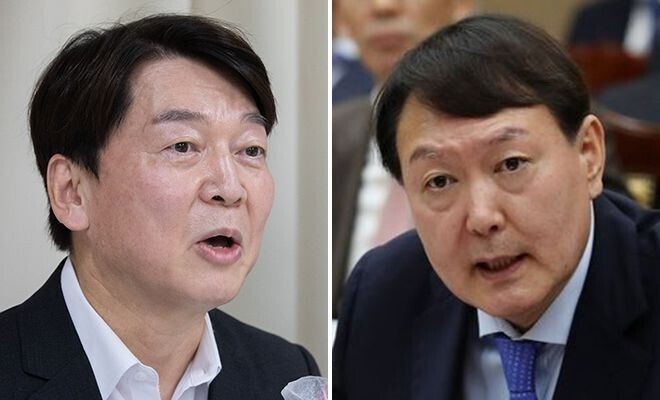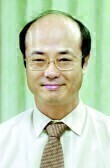hankyoreh
Links to other country sites 다른 나라 사이트 링크
[Column] Why third-way candidates never succeed in S. Korea

Since South Korea’s democratization in 1987, there has always been room for a third way in politics. But third-way candidates have always failed.
The first attempt was made by Chung Ju-yung, the late Hyundai Group founder, in 1992. In March that year, he set up the United People’s Party prior to the general election and built a 31-seat caucus in the National Assembly.
But when Chung ran in the presidential election that December, he only got 16.31% of the vote.
In 1995, Park Chan-jong made an independent bid for Seoul mayor in Korea’s first round of simultaneous nationwide local elections. Despite a Herculean effort, he came in second, with 33.51% of the vote.
Leading up to the 1997 presidential election, Rhyu Si-min wrote a book called “Rules of the Game for the 1997 Presidential Election.” He argued that, in order for power to change hands, a third-way candidate needed to run for president.
Kim Dae-jung, head of the National Congress for New Politics, said that three conditions had to be met simultaneously for the party to win the presidency. According to Kim, it would need the support of out-of-power figures and the enthusiastic backing of most of Kim Jong-pil’s supporters, and there would also need to be division within the ruling party. He said that would be as difficult as “a camel passing through the eye of a needle.”
Kim Dae-jung thought that the party would have to back an alternative candidate such as Seoul Mayor Cho Soon. Strictly speaking, he was calling for a proxy campaign, rather than backing a genuine third-way candidate. As it turned out, however, the camel managed to squeeze through the eye of the needle.
Even so, the third-way narrative didn’t lose momentum. The third-way candidate in the 2002 presidential election was Chung Mong-joon, then a member of the National Assembly. He eventually withdrew his candidacy in favor of Roh Moo-hyun, candidate for the Millennium Democratic Party.
The third-way candidate in the 2007 presidential election was Lee Hoi-chang, who was unaligned. That was his third time to run for president, so perhaps he doesn’t deserve the label “third way.”
Ahn Cheol-soo, then a professor and political neophyte, emerged as a third-way candidate in 2011, and he’s maintained that status ever since. He ran in the 2012 presidential election, the 2016 general election, the 2017 presidential election, the 2018 Seoul mayoral election, and the 2020 general election, losing nearly every time. His bid to be the coalition candidate for the opposition in the April 7 by-election for the Seoul mayoralty was likely his last chance as a third-way candidate; once again, he failed.
Three reasons third-way candidates failWhy is it that third-way candidates always fail in South Korean politics?
The first reason is their anti-political posture. Third-way candidates have always exploited resentment of the political process — that was true of Chung Ju-yung, and also of Ahn Cheol-soo.
It’s hypocritical for a politician to strike an anti-political pose. Voters may seem naive, but they’re not stupid.
The second reason is that confirmation bias is gradually getting more severe, as a side effect of the information age. In the past, when beliefs clashed with the facts, people changed their beliefs. But nowadays, people refuse to accept the facts.
In an ecosystem that only recognizes “us” and “them,” it’s hard for a third-way candidate to break in and create their own space.
The third reason is that the ownership of the parties has changed.
A little explanation is needed here. In the past, parties were owned by their leader. Parties were easy to establish, and to dissolve. But now, parties are owned by party members. It’s no longer easy to set them up or to get rid of them.
That makes it almost impossible for a third-party candidate to create a new party to serve as his or her political base.
Does that mean that third-way candidates will disappear from Korean politics? Could Ahn Cheol-soo be the last of his kind?
It’s not that simple — and the reason is former Prosecutor General Yoon Seok-youl. As Ahn’s mystique fades, Yoon is moving into the third candidate spotlight. It’s a curious development.
Yoon has been maxing out in surveys on preferences for the political leaders of the future. Yoon himself seems more baffled than anybody.
This may explain why he sought out a centenarian philosopher to ask, “Is it all right for me to go into politics?”
What’s the explanation for Yoon’s soaring popularity? The answer lies in the missteps of the Moon Jae-in administration. By going overboard in its attempts to discipline Yoon, the administration gift-wrapped him the image of a “persecuted martyr.”
With the eruption of the Korea Land and Housing Corporation (LH) scandal, Yoon has emerged as a viable political alternative to hold the Moon administration to account. But that’s about it.
Can Yoon actually compete in next year’s presidential election? I don’t think so. There are two reasons for this.
First of all, he’s a third-way candidate. The limits are clear. At some point, the bubble is going to burst.
Second, if he does run, the South Korean prosecutors will devolve into a political organization on his behalf. Perhaps it’s unthinkable, but it can’t be allowed to happen.
These days, some commentators suggest that Yoon could be president — even a good one.
It is fair to criticize the Moon administration’s missteps. But it’s going too far to lead the parade in turning Yoon into South Korea’s next president. At the current rate, these commentators are going to end up paying a steep price for deceiving the public.

By Sung Han-yong, senior staff writer
Please direct comments or questions to [english@hani.co.kr]

Editorial・opinion
![[Guest essay] Preventing Korean Peninsula from becoming front line of new cold war [Guest essay] Preventing Korean Peninsula from becoming front line of new cold war](https://flexible.img.hani.co.kr/flexible/normal/500/300/imgdb/original/2024/0507/7217150679227807.jpg) [Guest essay] Preventing Korean Peninsula from becoming front line of new cold war
[Guest essay] Preventing Korean Peninsula from becoming front line of new cold war![[Column] The state is back — but is it in business? [Column] The state is back — but is it in business?](https://flexible.img.hani.co.kr/flexible/normal/500/300/imgdb/original/2024/0506/8217149564092725.jpg) [Column] The state is back — but is it in business?
[Column] The state is back — but is it in business?- [Column] Life on our Trisolaris
- [Editorial] Penalties for airing allegations against Korea’s first lady endanger free press
- [Editorial] Yoon must halt procurement of SM-3 interceptor missiles
- [Guest essay] Maybe Korea’s rapid population decline is an opportunity, not a crisis
- [Column] Can Yoon steer diplomacy with Russia, China back on track?
- [Column] Season 2 of special prosecutor probe may be coming to Korea soon
- [Column] Park Geun-hye déjà vu in Yoon Suk-yeol
- [Editorial] New weight of N. Korea’s nuclear threats makes dialogue all the more urgent
Most viewed articles
- 1Behind-the-times gender change regulations leave trans Koreans in the lurch
- 2Family that exposed military cover-up of loved one’s death reflect on Marine’s death
- 3Yoon’s revival of civil affairs senior secretary criticized as shield against judicial scrutiny
- 4South Korean ambassador attends Putin’s inauguration as US and others boycott
- 5Marines who survived flood that killed colleague urge president to OK special counsel probe
- 6‘Weddingflation’ breaks the bank for Korean couples-to-be
- 7Hybe-Ador dispute shines light on pervasive issues behind K-pop’s tidy facade
- 8Lee Jung-jae of “Squid Game” named on A100 list of most influential Asian Pacific leaders
- 9Yoon’s broken-compass diplomacy is steering Korea into serving US, Japanese interests
- 10U.S. band that performed in N. Korea looking forward to going back